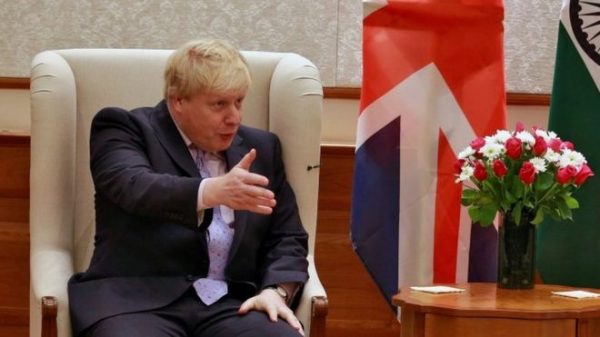
Alexander Boris Johnson, the prime minister of the United Kingdom, was angry that Black Lives Matter protesters tampered with Winston Churchill’s statue following a global protest against police bestiality and police brutality against black people as endemic structural racism in America and Europe following the murder of George Floyd.
A February 2, 2002 article has the title: ‘Africa is a mess, but we cannot blame colonialism.’ The author, Boris Johnson, wrote that piece as a newspaper editor and columnist. Today, the man who is the Prime Minister of Britain saw Africa and Africans as a horrid blot – a dark mark, a stain, dirt.
However, Johnson would forcefully argue that the poverty of everything in Africa should stop being seen as a blot on the conscience of the West because of colonialism. Whatever Africa suffers is either self-created or its destiny – which is worse.
Johnson’s solution to the black man’s eternal retardation is recolonization, which he hinted was needed if Africa would ever be useful for anything and for anyone, including itself.
“The problem (of Africa) is not that we were once in charge, but that we are not in charge anymore. The best fate for Africa would be if the old colonial powers, or their citizens, scrambled once again in her direction, thinking that this time they will not be asked to feel guilty.” I am not sure if black dudes who kill themselves and others to live in Europe would squirm at his suggestion.
Prime Minister Johnson Born June 19, 1964, the Gambia became independent from his country for less than a year; Johnson is today the British Prime Minister.
Moreover, there is an ongoing debate in his country on whether he still holds on to those 2002 views about recolonizing the continent in order to save it. We will be shocked if Boris Johnson has stepped away from his recolonization pill for the black man’s headache.
The white world has, in recent weeks, been assisting in reevaluating black lives. They have joined blacks to shout ‘Black Lives Matter’ as the world agonizes over deadly racism abroad. However, how much value do the blacks place in their own lives, especially in Africa? Is it the destiny of the black man to suffer and be pitied from eternity to eternity?
The black man was the one who suffered slavery, and the slave trade more than anyone else. The black man is the one whose experience of colonialism will rankle forever, even when other victims have outlived that past.
The Balck Live Matters protestors called Wiston Churchill’ racist,’ and Prime Minister Johnson was livid. Boris Johnson warned that no one should attempt to ‘censor’ or ‘edit’ his country’s past and history. He was probably right.

Every nation has its idea of ‘right’ and ‘wrong’ and of who a hero is, and should be. We blame colonialism and colonialists for our woes, but slavery came before colonialism, and some black persons’ ancestors built fame, name, and wealth from buying and selling their neighbors’ children.
Most Britons have only just found out who Prime Minister Winston Churchill is. After all, the slave trade has been erased from Britain’s self-image — along with colonialism. Vandalism is to be deplored, but it has forced Britain to remember and confront its culpability in crimes against humanity.
The British came to one of the most prosperous continents in the world and over 200 years of exploitation, loot, and destruction, reduced it to a poster child for third world poverty. Churchill is a man the British would have us hail as an apostle of freedom and democracy when he has as much blood on his hands as some of the worst genocidal dictators of the 20th century.
British writer Laurie Penny, “young Britons of every class, have no idea about our colonial past” as the “graphic facts of what the British did around the world, including to the people of this country” had been deliberately concealed from them “The crimes of the British over 400 years of pillage and conquest is something that we do not like to think about, and yet it is everywhere in modern British history,” she said.
Moreover, we still enjoy the perks, generation to generation. How many of the local enablers of slavery and slave trade and other historical wrongs face protests in Africa? Furthermore, after slavery and colonialism, have we not created a more virulent local strain of slave owners and taskmasters to whom we daily pour libations?





